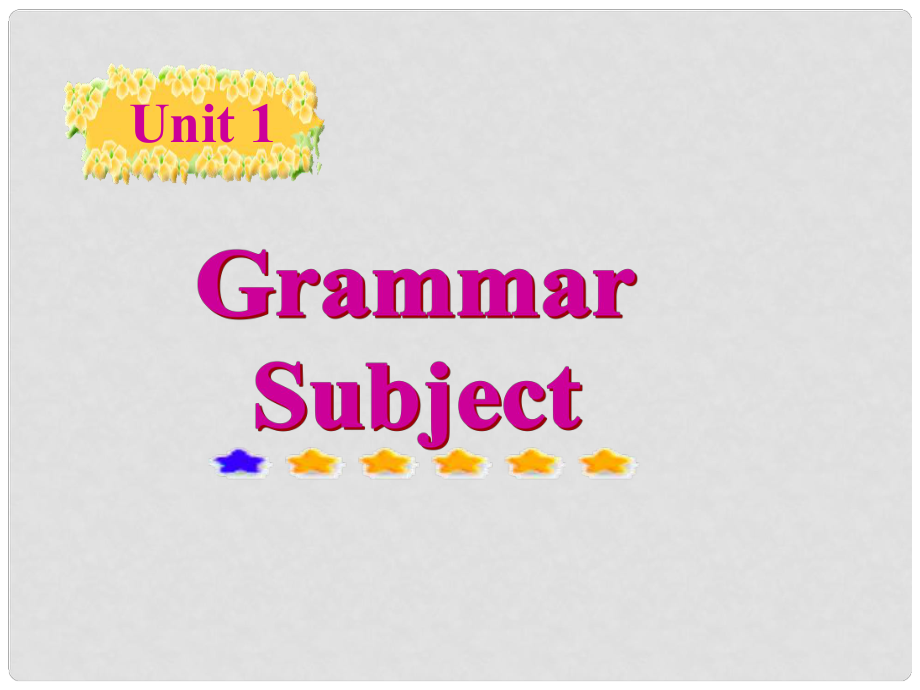《高中英語(yǔ) Unit 1 Breaking records Grammar課件1 新人教版選修9》由會(huì)員分享���,可在線閱讀����,更多相關(guān)《高中英語(yǔ) Unit 1 Breaking records Grammar課件1 新人教版選修9(36頁(yè)珍藏版)》請(qǐng)?jiān)谘b配圖網(wǎng)上搜索�����。
1、Unit 1SUBJECT The subject of a sentence is the person, place, thing, or idea that is doing or being something. 1. What is Subject? You can find the subject of a sentence if you can find the verb. Ask the question, “Who or what verbs or verbed?” and the answer to that question is the subject.Noun, ad
2����、jective, nonfinite verb, it, nominative personal pronoun and the subject clause and so on. 2. What can be used as Subject? A tree has fallen across the street.The ambulance is arriving.名詞、代詞��、數(shù)詞���、不定式���、動(dòng)詞的名詞、代詞����、數(shù)詞、不定式����、動(dòng)詞的ing形式、從句等可作句子的主語(yǔ)�。形式、從句等可作句子的主語(yǔ)。1. 名詞作主語(yǔ)名詞作主語(yǔ)You are a middle school student.He lent
3���、 me his new bike.Three is enough.Two from five leave three.2. 代詞作主語(yǔ)代詞作主語(yǔ)3. 數(shù)詞作主語(yǔ)數(shù)詞作主語(yǔ)To find the truth is very difficult.Its is very difficult to find the truth.Smoking is bad for your health.Seeing is believing.4. 不定式作主語(yǔ)不定式作主語(yǔ)5. 動(dòng)名詞作主語(yǔ)動(dòng)名詞作主語(yǔ)A 動(dòng)名詞與不定式都可在句子中作主語(yǔ)���。動(dòng)名詞與不定式都可在句子中作主語(yǔ)。動(dòng)名詞作主語(yǔ)時(shí)一般來(lái)說(shuō)指的是一個(gè)概動(dòng)名詞作主
4�、語(yǔ)時(shí)一般來(lái)說(shuō)指的是一個(gè)概念或一個(gè)既成事實(shí)。念或一個(gè)既成事實(shí)����。如:如:Teaching English is my job. Teaching English 是一個(gè)概念名詞,而是一個(gè)概念名詞��,而不是一個(gè)動(dòng)作��。不是一個(gè)動(dòng)作��。B 當(dāng)一個(gè)不定式短語(yǔ)作主語(yǔ)時(shí)��,我們常用當(dāng)一個(gè)不定式短語(yǔ)作主語(yǔ)時(shí)���,我們常用It作形式主語(yǔ),而把真正的主語(yǔ)作形式主語(yǔ)����,而把真正的主語(yǔ)動(dòng)詞不定動(dòng)詞不定式放到句子后邊���。式放到句子后邊。這樣的句型還用在這樣的句型還用在Itsfor sb. to doItsof sb. to do中���。如果中���。如果Its后邊的后邊的形容詞與人的天資、秉性有關(guān)時(shí)��,必須用形容詞與人的天資��、秉性有關(guān)時(shí)�����,必須用I
5�、tsof sb. to do;這類形容詞包括�����;這類形容詞包括 good, bad, clever, stupid, wise, foolish, cruel, mean 等���。如果等��。如果Its后邊的形容詞與人的天資�、秉后邊的形容詞與人的天資、秉性無(wú)關(guān)時(shí)���,則要用性無(wú)關(guān)時(shí)����,則要用Its for sb. to do�����。The rich should help the poor.Old and young walked side by side.The disabled are being carefully taken care of.6. 名詞化的形容詞作主語(yǔ)名詞化的形容詞作主語(yǔ)7. 名詞化的過(guò)去分
6���、詞作主語(yǔ)名詞化的過(guò)去分詞作主語(yǔ)Whenever you come will be fine.8. 從句作主語(yǔ)從句作主語(yǔ)作主語(yǔ)的從句稱為主語(yǔ)從句����,作主語(yǔ)的從句稱為主語(yǔ)從句�����,可由可由that����,whether,wh-詞等引導(dǎo)�����。詞等引導(dǎo)��。Between six and seven in the morning is the time I go joggingNearby is a good place for camping9. 有時(shí)介詞短語(yǔ)�、副詞或其短語(yǔ)有時(shí)介詞短語(yǔ)、副詞或其短語(yǔ) 位于主語(yǔ)位置是倒裝結(jié)構(gòu)位于主語(yǔ)位置是倒裝結(jié)構(gòu) (1) It is + 形容詞形容詞(possible, clear, t
7��、rue, necessary, likely , nice 等等) + that(2) It is + 名詞名詞 (a pity , no use , a fact, no wonder 等)等)+ that用用 it 作形式主語(yǔ)的句型有:作形式主語(yǔ)的句型有:(3) It + 不及物動(dòng)詞不及物動(dòng)詞(follows, happens, turns out, goes without saying)+ that(4) It is + 過(guò)去分詞過(guò)去分詞(thought, known, mentioned, said, expected, suggested, may be safely said,
8�����、must be admitted, has been decided )+ that 在以上句型中在以上句型中It是形式主語(yǔ)是形式主語(yǔ), 真正的主真正的主語(yǔ)是語(yǔ)是that引導(dǎo)的從句�。引導(dǎo)的從句。在這樣的主語(yǔ)從在這樣的主語(yǔ)從句中句中that不能省略不能省略, 就其本質(zhì)講��,用就其本質(zhì)講����,用Thatis well-known; Thatis said也也是可以的。但是經(jīng)過(guò)長(zhǎng)期使用是可以的��。但是經(jīng)過(guò)長(zhǎng)期使用, 上述句上述句型已經(jīng)被固定下來(lái)。型已經(jīng)被固定下來(lái)�����。What he had already forgotten about computer repair could fill whole volu
9�、mes. 3. A simple subject can be more than one word, even an entire clause. 4. In English, the subject of a command, order, or suggestion - you, the person being directed is usually left out of the sentence and is said to be the understood subject.e.g. 1. You step lively there, or Ill leave you behin
10、d. 2. Before assembling the swing set, you read these instructions carefully.5. For purposes of sentence analysis, the doer or the initiator of action in a sentence is referred to as the agent of the sentence. In an active sentence, the subject is the agent.e.g. 1. The Johnsons added a double garage
11����、 to their house. 2. The jury returned a verdict of manslaughter.6. In a passive sentence, the agent is not the subject. In fact,sometimes a passive sentence willnot contain an agent. e.g. 1. The deans report was reviewed by the faculty senate. 2. Three cities in the countrys interior were bombed.AI
12、thank you.BI never heard of it.CIt looks like it.DIt sounds like common sense to me.EIt serves him right.7. In familiar speech, the subject is sometimes left out when it is a pronoun. We call it omission of the subject.In spoken English we often hear sentences like this:AThank you.BNever heard of it
13�、.CLooks like it.DSounds like common sense to me.EServes him right. Underline the subject in these sentences. In groups, check your answers. Then discuss whether you agree with the ideas in the sentences or not.1 Everything that we do is a step in one direction or another. Even the failure to do some
14、thing is in itself a deed. It sets us forward or backward. (Henry Van Dyke) 2 To regret ones errors to the point of not repeating them is true repentance. (Ernest Hemingway)3 The best companion is one who is wiser and better than ourselves, for we are inspired by his wisdom and virtue to nobler deed
15���、s. (William Makepeace Thayer)4 Being happy is better than being king. (West African saying)1 We wrote a letter of thanks to _ had helped us. A. who B. those C. whom D. whoever 2 Toms mother kept telling him that he mustnt smoke, but _ didnt help. A. he B. which C. it D. they3 _ you dont like him is
16�、none of my business. AWhat BIf CThat DWhether4 Just after finishing writing the composition, _. Athe doorbell rang loud BNancy heard the doorbell rang Csomeone knocked at the door Dthe doorbell was rung5-The exam was easy, wasnt it? -Yes, but I dont think _ could pass it. A. somebody B. anybody C. n
17���、obody D. everybody6 They live on a busy main road. _ must be very noisy. A. There B. It C. That D. They7 Im sure the Olympic Games will be held in 2008 in China, _? A. wont it B. wont they C. shall we D. arent I8 While watching TV, _. A. the boy came in B. my mother was cooking C. I heard a terrible
18��、 noise D. the doorbell rang9 Hes late,_ is often the case. A. as B. what C. it D. this10It was the training that he has as a young man _ led to his success. A. that B. it C. which D. who11_ about the history of that part because there is not enough written information. APeople know nothing BMuch is
19���、knownCPeople know a lot DLittle is known1 _ makes this shop different is that it offers more personal services. (2006 遼寧卷)遼寧卷)A. What B. Who C. Whatever D. Whoever 2 _ team wins on Saturday will go through to the national championships.(2006 山東卷)山東卷)A. No matter what B. No matter which C Whatever D. whichever3. _ felt funny watching myself on TV. (2007 全國(guó)卷全國(guó)卷II) A. One B. This C. It D. That4. _ he referred to in his article was unknown to the general reader. (2007 上海卷)上海卷) A. That B. What C. Whether D. Where
 高中英語(yǔ) Unit 1 Breaking records Grammar課件1 新人教版選修9
高中英語(yǔ) Unit 1 Breaking records Grammar課件1 新人教版選修9

